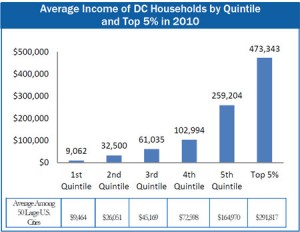The richest five percent of DC households have an average income of $473,000, the highest among the 50 largest cities in the U.S., according to a new report from the DC Fiscal Policy Institute. Meanwhile, the poorest 20 percent of District households have incomes averaging under $10,000. Income inequality in DC ‘ the gap between rich and poor ‘ is third highest among the nation’s largest cities. 
While the District’s economy has led to economic growth and prosperity for many middle and higher income families, residents on the bottom of the income scale largely are being left behind.
- The average income among the top five percent of DC households, $473,000, is higher than in any major U.S. city. Among the 50 largest cities, the average top income is $292,000.
- The poorest 20 percent of DC households fifth by income had an average income of $9,100. This is close to the average among the largest U.S. cities.
- The gap between high-income and low-income DC households is third-highest among the 50 largest cities, after Atlanta and Boston. In DC, the average income of the top fifth is 29 times the income of the bottom fifth. Among large U.S. cities, the top-to-bottom ratio is 18.
Addressing income inequality ‘ lifting the incomes of those at the bottom ‘ requires adequate funding for programs that support the city’s workforce and affordable housing supply.
- Welfare to Work (TANF): The District is starting to implement significant welfare-to-work reforms, which hold great promise to better prepare families for living-wage work. However, coinciding with the TANF redesign is a time limit policy that will reduce cash benefits for thousands of TANF families ‘ to as little as $260 a month ‘ before they have received education and training opportunities.
- Housing: In the midst of sharply rising housing costs, the District’s most important tools to help low-income families afford to live here’the Local Rent Supplement Program and the Housing Production Trust Fund’have experienced sharp budget cuts in recent years. DC is facing a shortage of affordable housing options, and without funding through these programs many low-income households will spend higher and higher percentages of their incomes on rent.
To view the full report on income inequality in DC, click here.
